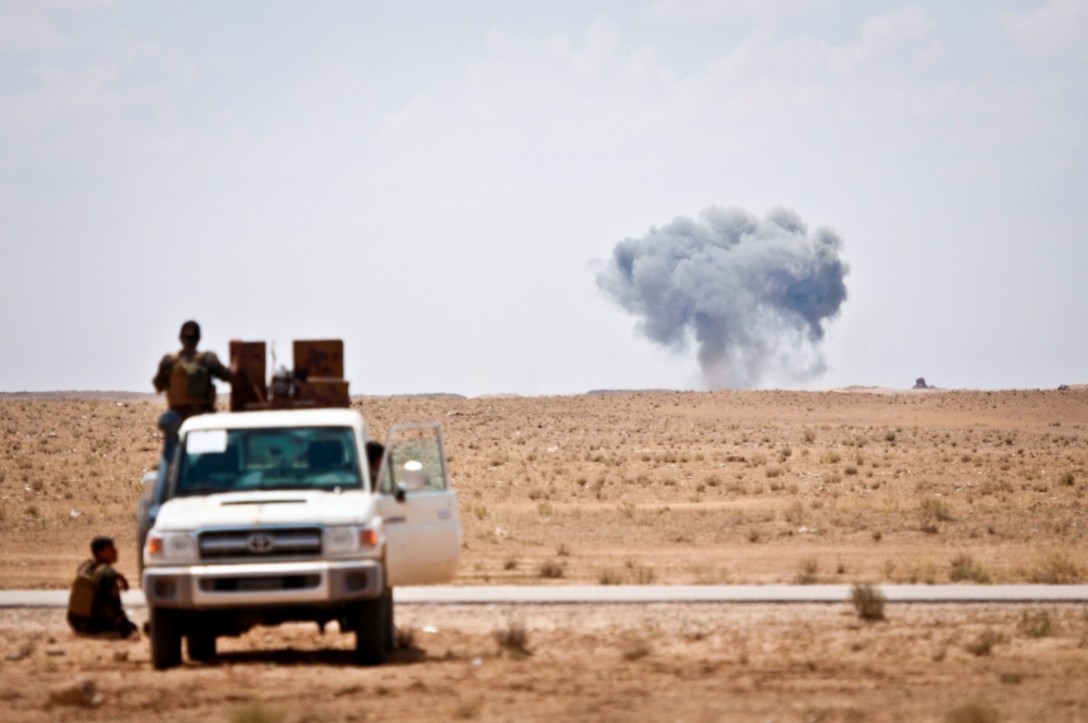Hybrid disarmament framework and slowdowns
The publication of the 4th monthly report by the Director-General of the Organisation for the Prohibition of Chemical Weapons (OPCW), Ambassador Ahmet Üzümcü, and UN Secretary-General Ban Ki-moon last month drew worldwide attention to Syria missing important interim deadlines for the removal of chemicals from its territory. US Ambassador Bob Mikulak’s head-on criticism of Syria’s procrastination at the latest OPCW Executive Council meeting reflected frustration shared by many states. The responsibilities Syria assumed under the US-Russian Framework agreement of 14 September, as a party to the Chemical Weapons Convention (CWC) and under UN Security Council Resolution 2118 (2013) include the …
Public Outreach in Destruction of Syrian CW
Open letter to Secretaries John Kerry and Chuck Hagel February 3, 2014 Secretary of State John Kerry US Department of State 2201 C Street, NW Washington DC 20520 Secretary of Defense Chuck Hagel US Department of Defense 1400 Defense Pentagon Washington DC 20301-1400 RE: Public Outreach and Stakeholder Involvement in Destruction of Syrian Chemical Weapons Dear Secretary Kerry and Secretary Hagel: We the undersigned environmental, public health, nonproliferation, and arms control experts have been closely following all aspects of the Syrian chemical disarmament process. We believe that the most urgent issue today is to make sure that …
Italy to the rescue
Reuters reported two days ago that Italy has agreed to provide a port to enable the safe transfer of Syria’s priority 1 chemicals from the Danish and Norwegian ships arriving from the Syrian port of Latakia to the US vessel Cape Ray for hydrolysis and neutralisation, most likely in international waters. Speculation about the proposed port arises now. Italian officials have thus far refused to identify it. According to the daily Corriere della Sera, as cited by The Voice of Russia, the chemicals will be kept in one of the Italian ports until the transfer to the Cape Ray. It …
Sea-based destruction of Syria’s CW proposed
A few days ago the press revealed that the United States has offered to neutralise some of Syria’s most dangerous chemicals aboard the Maritime Administration vessel MV Cape Ray. In the margins of the Conference of the States Parties to the Chemical Weapons Convention (CWC) currently underway in The Hague, more details about the proposed neutralisation process have become available. At the time of writing, it appears that the US proposal is the only viable chemical weapon (CW) disposal method on the table. Although a decision on method of destruction for Priority 1 chemicals is not expected before 17 December …
Allegations of CW use in Syria revisited
Since acceding the the Chemical Weapons Convention (CWC) last month, Syria has submitted detailed declarations about its chemical weapon (CW) holdings and activities. While confidential, details of the composition of the CW arsenal have emerged from documents published by the Organisation for the Prohibition of Chemical Weapons (OPCW). In particular, the publication of a request for expression of interest (EOI) by the commercial industry to dispose of certain toxic materials or their effluents has shed some light on Syria’s declarations. Looking at the listing of chemicals in the EOI, two substances intrigue me with regard to allegations of CW use …
Syria's CW declaration: One third larger than assumed
On 28 October, the UN Secretary General Ban Ki-moon presented the first report on the destruction of chemical weapons (CW) in Syria to the UN Security Council (UNSC). The document also included the report by Director-General Ahmet Üzümcü to the Executive Council of the Organisation for the Prohibition of Chemical Weapons (OPCW). The monthly submissions are required under paragraph 12 of UNSC Resolution 2118. Both officials recorded significant progress since the adoption of the key decisions by the OPCW Executive Council and the UNSC on 27 September. They noted Syria’s cooperation, and listed the challenges ahead and the requirements to …
A Nobel Peace Prize for Disarmament
Today Syria becomes the 190th party to the 1993 Chemical Weapons Convention (CWC). In the 16 years since entry into force on 29 April 1997, CWC universality now equals that of the 1968 Nuclear Non-Proliferation Treaty (which entered into force on 5 March 1970). The convention extends the 1925 Geneva Protocol’s ban on chemical (and biological) warfare by also comprehensively prohibiting the development, acquisition, transfer and possession of chemical weapons (CW). Indeed, the norm against CW has become so overpowering that a relatively small chemical attack by historical standards in Ghouta (Damascus) on 21 August brought allies and foes of …
CW disarmament and constructive engagement on Syria
Hearing before the Committee on Political Affairs and Democracy of the Parliamentary Assembly of the Council of Europe (PACE) Strasbourg, 30 September 2013 …
Internationalisation of Syria’s chemical weapon stockpile?
The idea of internationalising Syria’s stockpile is doable, but what would it take? Some first thoughts to launch an international and constructive discussion by Jean Pascal Zanders and Ralf Trapp Yesterday, Russian Foreign Minister Sergey Lavrov launched an idea—in the meantime accepted by Syria—based on an offhand remark by US Secretary of State that Syria might avoid punitive military strikes if it were to ‘turn over every single bit of his chemical weapons to the international community in the next week’. He said: We are calling on the Syrian authorities not only agree on putting chemical weapons storages under international …
Syria: incendiary weapon used against civilians
The BBC carries very graphic footage of the aftermath of an incendiary bomb dropped by a fighter jet on to a school playground in the north of Syria. Scores of children have napalm-like burns over their bodies. An incendiary weapon is not a chemical weapon as defined by the Chemical Weapons Convention, because it harms humans through heat rather than the direct effects of poisoning. They include weapons such as napalm or white phosphorus. Incendiary weapons are banned by the Convention on Certain Conventional Weapons (also known as the Inhumane Weapons Convention), Protocol III. Article I defines an incendiary weapon …

